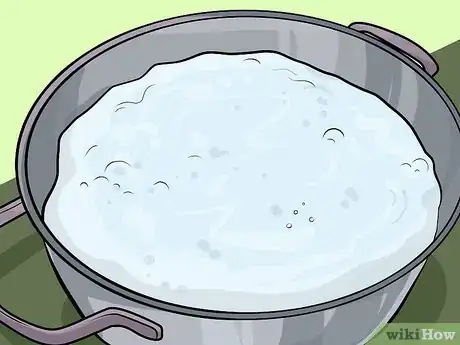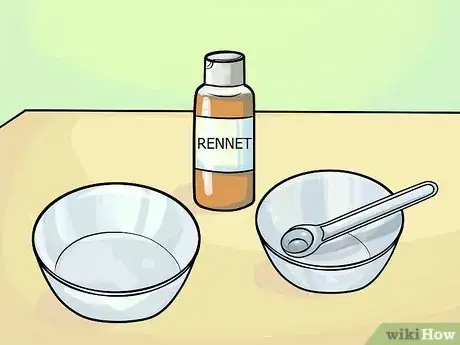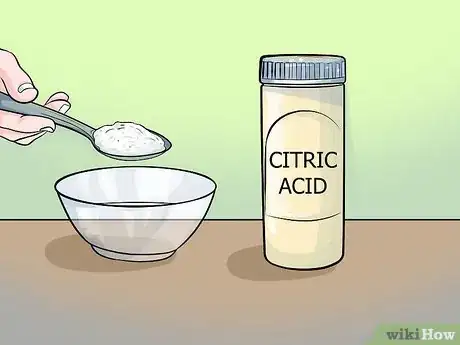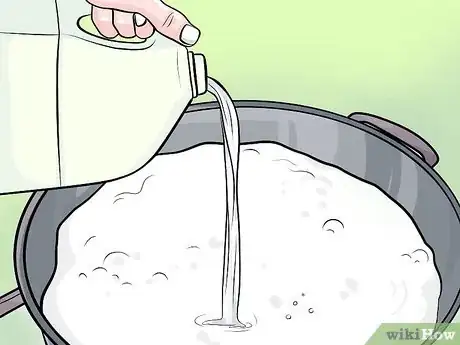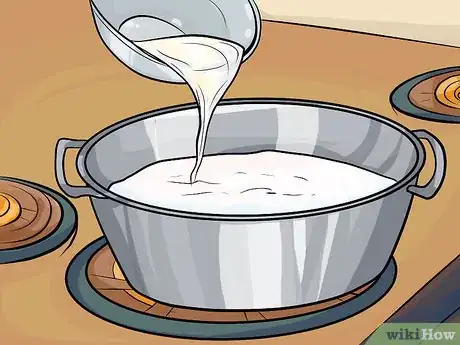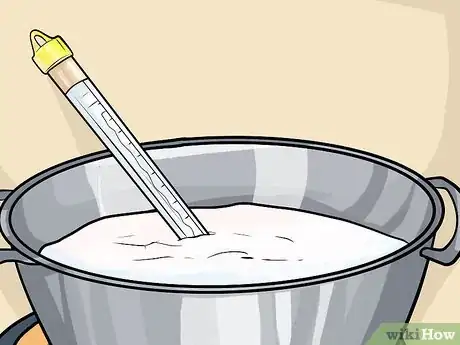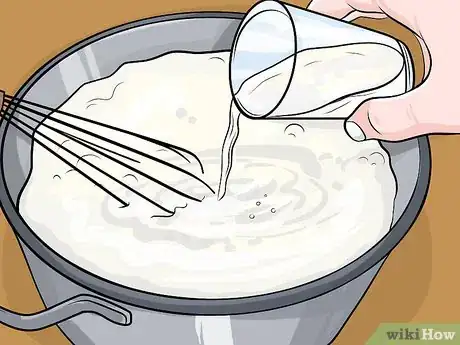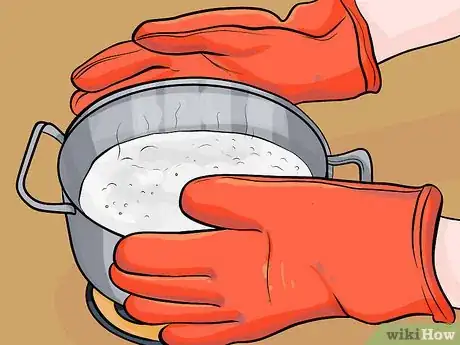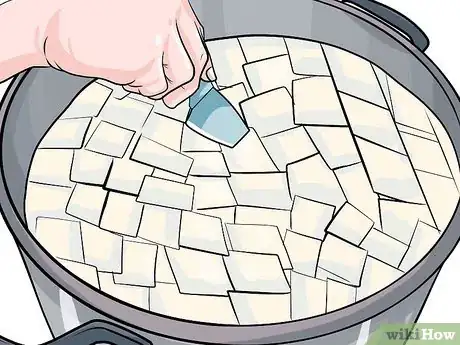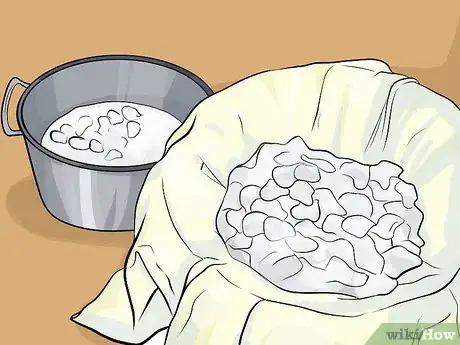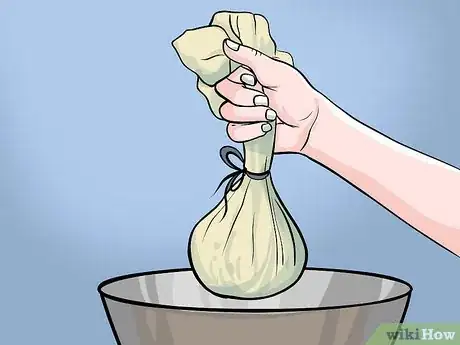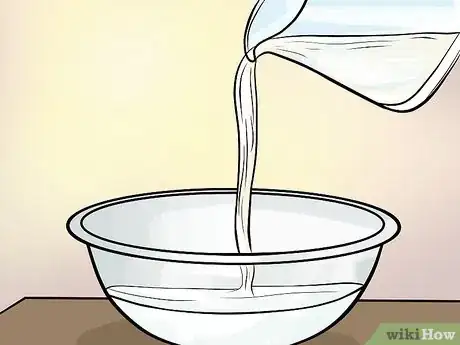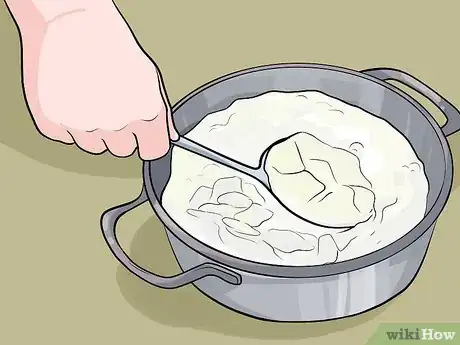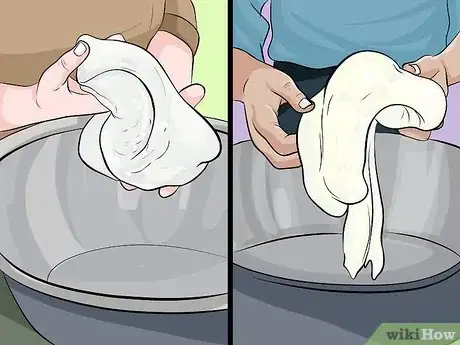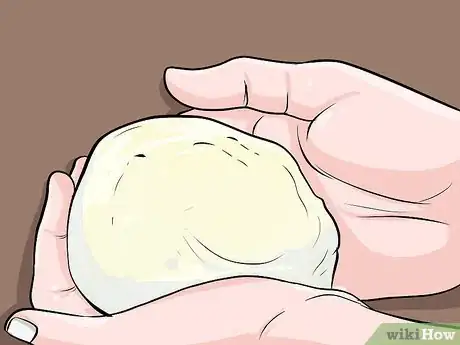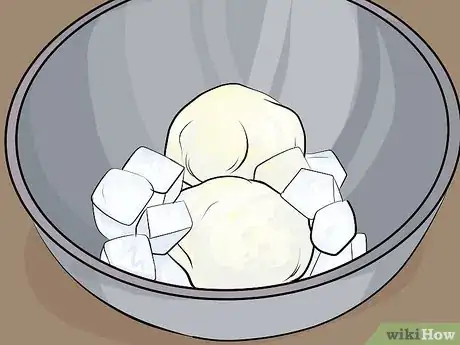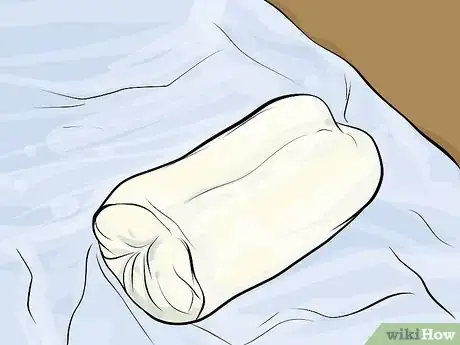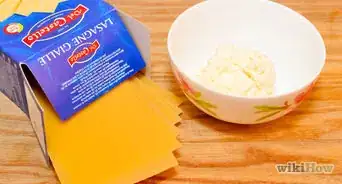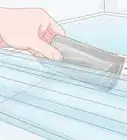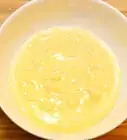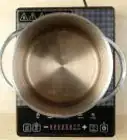X
This article was co-authored by wikiHow Staff. Our trained team of editors and researchers validate articles for accuracy and comprehensiveness. wikiHow's Content Management Team carefully monitors the work from our editorial staff to ensure that each article is backed by trusted research and meets our high quality standards.
This article has been viewed 65,136 times.
Learn more...
Fresh mozzarella is one of the few cheeses that you can make at home pretty easily. This soft, delicious cheese can add a kick to almost any sandwich, pizza, or salad. If you want to know how to make fresh mozzarella cheese, just follow these steps.
Ingredients
- 1 gallon (3.8 L) of pasteurized non-homogenized whole milk, not ultrapasteurized or raw milk
- ½ tablet or .5 tsp. (2.5 ml) liquid rennet
- ¾ cup (175 ml) non-chlorinated distilled water
- 2 tsp. (10 ml) citric acid powder or lemon juice
- 2 tbsp. plus ½ tsp. (32.5 ml) salt
Steps
Part 1
Part 1 of 3:
Preparing the Milk and the Rennet
-
1Bring a large pot of water to a simmer on the stove. It will register 180ºF (82ºC) on a thermometer.
-
2Add the rennet to the water. Add ½ tablet or ½ tsp. (2.5 ml) of liquid rennet to ¼ cup (60 ml) of cool distilled water. Stir the tablet until it's dissolved and set it aside.Advertisement
-
3Add the citric acid powder to the water. Add 2 tsp. (10 ml) of citric acid powder to 1/2 cup (120 ml) of cool distilled water. Stir until it is dissolved.
-
4Pour the milk into a pot. Place 1 gallon (3.8 L) of pasteurized milk into a 6-8 qt. (5.7-7.6L) pot. Do not use ultra pasteurized (UHT) milk. UHT milk does not form a solid enough curd to make mozzarella cheese.
-
5Pour the water in with the dissolved citric acid into the milk. Stir gently, and there will be some curdling.
Advertisement
Part 2
Part 2 of 3:
Making the Curd
-
1Heat the mixture until it reaches 88ºF (31ºC). Use medium-low heat. Stir occasionally to keep the milk from scorching. You can use a whisk, spoon, or heatproof spatula. The curd will begin to develop at this stage. Use a thermometer to determine when the milk reaches 88ºF (31ºC).
-
2Add the water with the dissolved rennet to the milk mixture. Stir carefully for 30 seconds and then lower the heat to low. Cook the milk mixture over low heat until it reaches 105ºF (40ºC).
-
3Take the pot off the stove and let it stand undisturbed for 15 minutes. This will allow the curd, which is the white mass, to separate from the whey or liquid before cutting the curd.
-
4Cut the curd. Cut the curd into one inch (2.5 cm) squares with a knife then let it rest for about 5 minutes. It may help to hold the curd still with a ladle or large spoon while you are cutting. Hold a knife straight upright and cut the curd into slices in the pot. Then repeat the same cuts with the knife at an angle. Turn the pot, cut, and cut again to make a checkerboard of cuts.
- You may not be able to see your previous cuts. Just do the best you can to make it even.
-
5Place a colander or a piece of cheesecloth over a bowl. Use a stainless steel slotted spoon to transfer the curd from the pot and place it in the colander or cheesecloth, collecting any whey that drains off in the bowl beneath. If you are using cheesecloth, you can tie the ends and hang the mozzarella to drain for three to four hours if you would like a firmer cheese. If you choose this option, do not return it to the pot after draining before adding the salt and starting to work the curd.
- When you're done, transfer the whey that has drained off back to the pot.
-
6Prepare the curd. To prepare the curd, you should first place the colander of curd into the pot of whey to maintain its temperature. Then, add ½ tsp. (2.5 ml) of salt to the curd. Once you've done that, you can fold the curd over on itself to increase the draining of whey. The more you fold the curd at this point, the more dry your mozzarella will be.
-
7Pour some water from the simmering pot into a large bowl. The water should be 170 - 175ºF (76 - 79ºC).
-
8Transfer the curd to the hot water. Place one-third of the curd in the hot water at a time and let sit for approximately three minutes. Drain the water and then sprinkle two tablespoons of salt on it. Place two to three cups onto the curds and let sit for two minutes. Then, take a wooden spoon and begin to push all the curds to one side of the bowl. If the cheese curds are ready for stretching, they will stick together. If the curds aren't sticking together, then you may have to add more hot water and let sit a little longer. When it sticks together well, it's time to stretch!
Advertisement
Part 3
Part 3 of 3:
Making the Cheese
-
1Remove the curd from the water. When you do this, you should stretch it when it gets sticky enough that it begins to hold together. If it does not stretch, check the temperature of your water. It may be too cool. If the mozzarella cheese begins to tear, place it back in the water for a moment to heat up again. Stretch the mozzarella cheese in two inch strips and fold it over on itself several times.It is important not to overwork the cheese, for it will make a dry and hard mozzarella ball.
-
2Shape the mozzarella cheese. Form the mozzarella cheese into a ball when it forms a mass and has a sheen. To accomplish this, fold a two inch strip over 3 times and then force it through your thumb and index finger. Once you have a ball, squeeze your thumb and index finger together to break loose the bottom of the mozzarella ball from the rest of the cheese strip.
-
3Make the brine. Mix 2 cups (465 ml) of whey with 2 tbsp. (10 ml) of salt and some ice. This is the brine for your mozzarella cheese. You can cool the mozzarella cheese in the brine. When it has sufficiently cooled, you can remove it from the brine.
-
4Store the cheese. Wrap it in plastic wrap or store it in an airtight container. Refrigerate it for up to a week or freeze it for up to a month.
Advertisement
Community Q&A
-
QuestionWhat can I use instead of rennet?
 MicheleTop AnswererSome alternatives to rennet that can achieve the same result include citric acid, vinegar and lemon juice. It's the acid that's needed to curdle the milk. Use 1/2 cup of vinegar or lemon juice to every gallon of cold milk. The rennet is used to make the curds before cooking them to make the mozzarella. Any type of acid will do the same.
MicheleTop AnswererSome alternatives to rennet that can achieve the same result include citric acid, vinegar and lemon juice. It's the acid that's needed to curdle the milk. Use 1/2 cup of vinegar or lemon juice to every gallon of cold milk. The rennet is used to make the curds before cooking them to make the mozzarella. Any type of acid will do the same. -
QuestionWhy, when I smoke my mozzarella, does it melt?
 MicheleTop AnswererCheese needs to be cold-smoked, meaning to keep the temperature below 90 degrees F (32.2 Celsius). See How to Smoke Cheese for some ideas on the best ways to do this.
MicheleTop AnswererCheese needs to be cold-smoked, meaning to keep the temperature below 90 degrees F (32.2 Celsius). See How to Smoke Cheese for some ideas on the best ways to do this.
Advertisement
Things You'll Need
- Large pot
- 6-8 qt. (5.7-7.6L) pot
- Sharp knife
- Small bowl
- 2 large bowls that hold about 1 gallon (3.8 L) each (3.8 L)
- Measuring cups and spoons
- Stainless steel slotted spoon
- Colander
- Thermometer
- Thick rubber gloves
References
About This Article
Advertisement
